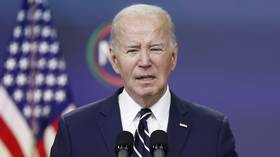Corporate American finds friends on the high court
Recent Supreme Court rulings supporting big business have caused activist groups to lash out at what they consider a misuse of the court's power.
The US Constitution guarantees a separation of power between the three branches of government – the president, congress and the courts. But some groups are arguing that lately corporations are taking some of that power for themselves.
It’s an issue MoveOn.org is placing front and center in a full-page ad running in The Washington Post on May 9. The ad calls out the Supreme Court for being too close to companies like Aetna, British Petroleum and Goldman Sachs. The ad goes on to read that the Supreme Court was founded to protect the American people, not big business.
Radio host Thom Hartmann has been talking about this issue for some time and it is an issue that US President Barack Obama is passionate about. Obama even called out the Supreme Court for a recent decision that eliminates a long-standing ban on political spending by corporations in elections.Some of those concerned point out potential future cases to be heard by the high court. Last month, the Supreme Court heard arguments in a case involving genetically engineered food products, specifically a breed of pesticide-resistant alfalfa, currently banned from the US farming industry. Corporate giant Monsanto is a defendant in the case. The litigation will be decided in June, and those in favor of keeping the ban are not optimistic, based on some close contact between Monsanto and the court.
“Frankly, it needs to be said that they have a friend on the high court, and it’s Justice Thomas, who is a former Monsanto attorney,” said Bill Freeze, from the Center for Food Safety.
As the lines become more and more blurry, Hartmann foresees a steady increase in corporate power, which will offset the delicate balance dictated by the Constitution.
“If we continue down that road, we’re going to end up with a country more like what Mussolini envisioned than what Jefferson envisioned,” Hartmann said.












